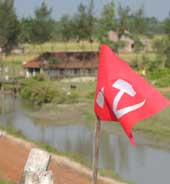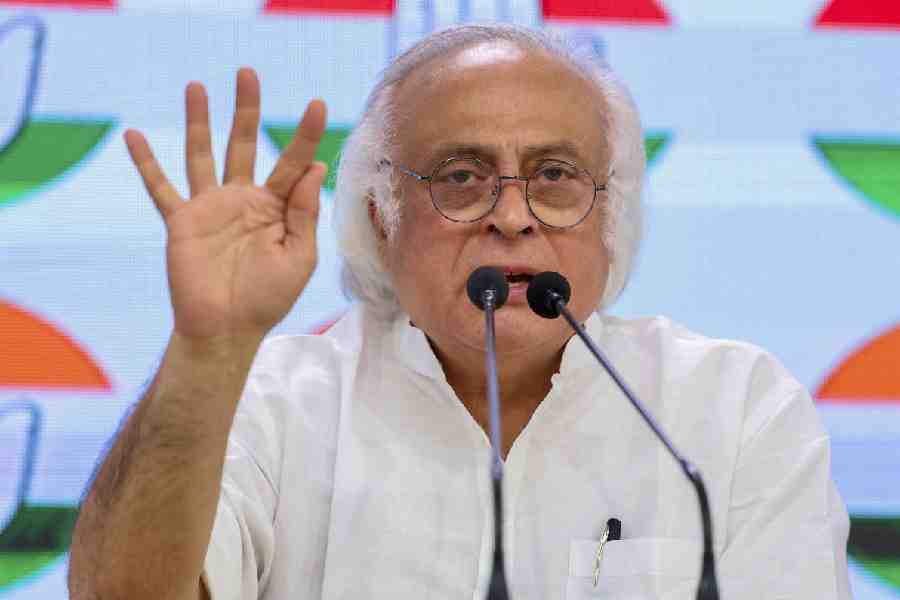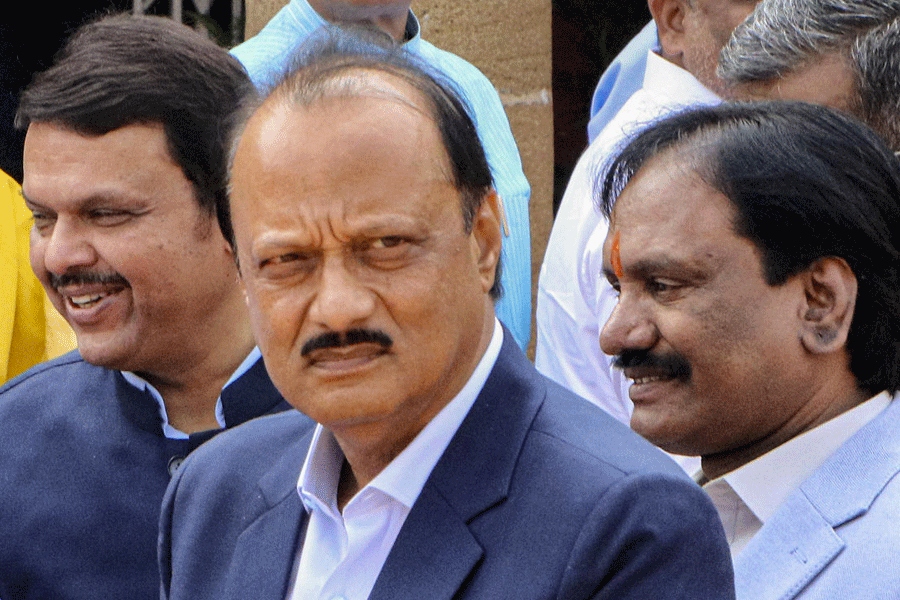|
|
| After the peace |
“Everything has been looted,” said the man I started speaking to first after he appeared out of nowhere when we stood at the foot of Bhangabera bridge, now festooned with CPI(M) flags. He said he had spent 11 months in one of the camps in Khejuri with 87 other families. His remark was almost an echo of the repeated complaint we had heard at the relief camp in Brajamohan Tewari Shikshaniketan earlier. Almost, because this complaint was not filled in with any detail. Not one of the many details of things and methods of looting that had been given us by different people in the school. This, instead, was a statement, one of many that were pronounced by him and others who joined us; there was no scope to ask questions. At the same time, there was no reason to disbelieve him. A large number of his Bhoomi Uchchhed Pratirodh Committee antagonists had once been CPI(M) workers. Why should their methods be different?
What was strikingly different from the relief camp that afternoon on November 18 was the atmosphere at the foot of the bridge. Our little group, having left the relief camp in the school in Nandigram town, had travelled down the road past Sonachura along roads strangely empty even for a Sunday afternoon, stopped once at the red-flag-and-banner cloaked Sonachura bazaar, and had reached the bridge spanning Talpatti canal.
It is good to think that now these roads and paths have more people, going back home, trying to go on with the business of their lives. At the bridge, my friend, who was the only other woman in the group, asked two women crossing it towards Khejuri how they were, how things were. “We do not know anything,” they said.
The three or four men who appeared first were somehow different from the few who joined us later. The gentleman I spoke to could have been a member of the relief camp we had just left. But he started the conversation with a theme that would become more strident and accusing as time wore on, taken up with increasing aggressiveness by the others, silencing all questions, all efforts at reasoned exchange — “Where were you all these 11 months?”
The originary moment for the women in the relief camp had been March 14. For the men at the bridge it was the hideous lynching and burning of Sankar Samanta in January. “Can you imagine how it hurt us, how we felt? And no one came to see how we passed these 11 months, and now you come with relief and sympathy for those who laid mines?” It would have been inhuman to mention that Samanta’s terrible death was not the first one that January: three deaths had preceded it, and one of the dead was a teenager.
One of Samanta’s brothers was called; his eyes were red and he kept describing over and over exactly how his brother had died while he had to watch, and said he could not speak without feeling his heart would burst. Yet, none of them had got any sympathy. “They want us never to return,” they said, “They wanted to do a CPM nidhan yajna.” The last phrase was repeated like a burden to a song.
I tried to ask, at three different times during the choric tirade, that even if “we”, unconcerned visitors from the city, had not come, surely their leaders had visited them during these months. The full question could be articulated only once. It was answered with another description of the pain they felt at Samanta’s murder and the rape and murder of Sumita Mondal. Twice more my incomplete query was drowned with accusations of partisan behaviour, with repeated questions as to whether “we” had ever thought what they were eating in their relief camps, how their wives and children were. Anindita Sarbadhicary was the only one who visited them, we were told. That was answer enough.
While I kept trying to work out how it was our fault that we had come to visit them when we could, I managed to gather that 1,500 people had been in five relief camps, and that all of them had returned home after November 6. I was grateful, for the numbers taking shelter in Khejuri had always mystified me, changing from 400 to 900 to 3,000 and then to 5,000.
But an important change had occurred about five minutes into our efforts at conversation. A youngish man appeared from the direction we had come, parked his bike and demanded to know exactly who we were. He was far better dressed than any of the others, and he announced his name like a readied weapon. There were suddenly a few more people around us, thirty-something or a bit younger, strongly built, aggressive in stance, expression and voice. The theme of where we were these 11 months took on a different edge with the leading man’s entry, and he immediately focussed his rage on my friend, who handed him her business card when he called for proof of identity.
After he had asked us what we did and what the registration numbers of our NGOs were, my friend asked him, politely, what he did. “I am bekar (unemployed),” he announced, “I manage with farming.” “Oh, you’re a farmer, then you’re not unemployed,” my friend exclaimed. His hostility, which was showing itself in growing rudeness, seized on this response and instantly made it unrecognizable. “See, see,” he cried to his men (who had been passing round comments of “anti-CPM” and “Brought relief to that camp” within my hearing), “they want peasants’ sons to remain peasants. They don’t want us to have industry here. They don’t want us to have the money they have. Look at the clothes she is wearing. How much salary does she get? How dare you people come here? We don’t want your help. You can go help the Maoists.”
Maoists had been there since January, they said, singing English songs and Nazrulgeeti, and helping villagers cut through the roads. Students from Calcutta University and Jadavpur University came and made friends with the simple women of the villages, then stayed on to make guns and lay mines. Medha Patkar had come four or five times — and he was not going to check up on the dates, why should he? — with twelve people in the car and always left with two. He knew our type, he said, it was no wonder that we should not want them to have the good things we had.
I cannot reproduce the exact order and simultaneity of the non-conversation and series of insults that ensued. There was a tremendous noise of raised male voices, and each of the comments above was taken up by the other men at regular intervals and chanted. I remember one of our companions saying that they were mistaking the meaning of my friend’s response, but that did not make any difference. “She is rubbish,” the not so gentle man kept repeating, and his friends joined in hasty chorus. My friend’s quiet response to his insulting remarks and her simultaneous refusal to give any ground had infuriated him. But there was something practised in that fury, and in its rhythmic repetitions.
He was persuaded away, it seemed, as if from the brink of the unsayable. While he talked, no one else was allowed to speak. “No side conversations,” I was told, “no one is to speak.” But, suddenly, the leading man decided to take me aside to give me names of Maoists. I first walked away, saying I would not speak to him if he kept insulting my friend. But the names of Maoists were important enough for him to stop yelling “She is rubbish” to prompt the others to keep up the refrain. He drove the others away and ordered me to write the names down. I started with the names of a father and son.
“Did you, or anyone else here, see them, speak to them?” I asked. There was a moment of speechless rage. “Don’t you or your friends know how to talk?” he shouted. “Don’t you understand which questions are relevant? How could we see them? They ran away because we came.”
“Since you have the names, I have to ask how you know.”
“By looking at me you should know what questions to ask, what you are permitted to ask. Can’t you see who you are speaking to? You cannot ask any question you wish.” Irrelevant as judged, I worried about the women in his household.
“Give the names,” someone prompted. So I wrote some more, one of a man who was supposed to have been a workman at the weapons factory at Golbari. “But someone must have seen them if they were here for so long,” I dared the impermissible. “Yes, yes, call the two boys,” said the prompter, mentioning two names. “These boys were staying here throughout,” he added.
A young man, almost a boy, spoke to me about one Maoist, who, he said, had been there from the beginning. The young man looked as though a storm had blown over him; his eyes were sunken, dull, his voice so low I could barely hear it, his words expressionless. He spoke with much prompting. An older man with him spoke with greater certainty, and with politeness.
By the time we were finished, I realized that the temperature around me had risen another notch, quite inexplicably. As we walked towards our car, there was a sudden tuning up of hostility, and a rush towards the car. A contact number one of the men had given to my friend had to be blotted out at the leading man’s direction, and he gave a quick shouted order to search the car. They had heard a bang in it. My friend did say they had no right to do that, but before things got worse the driver just opened the doors casually and said, “Go ahead.”
While the others went through it and we sat inside, the leading man pointed to my friend’s bag and shouted, “How much does that bag cost?” “Oh,” said another, “and the car? Isn’t that industry? Doesn’t it need petro-chemicals?” Our driver moved swiftly, whirring the engine into life and shooting away over the first uneven stretch of road on the long way back to Calcutta.
He said later that he had seen one of the men lift a piece of rubble. I am sorry I missed that last sight.











